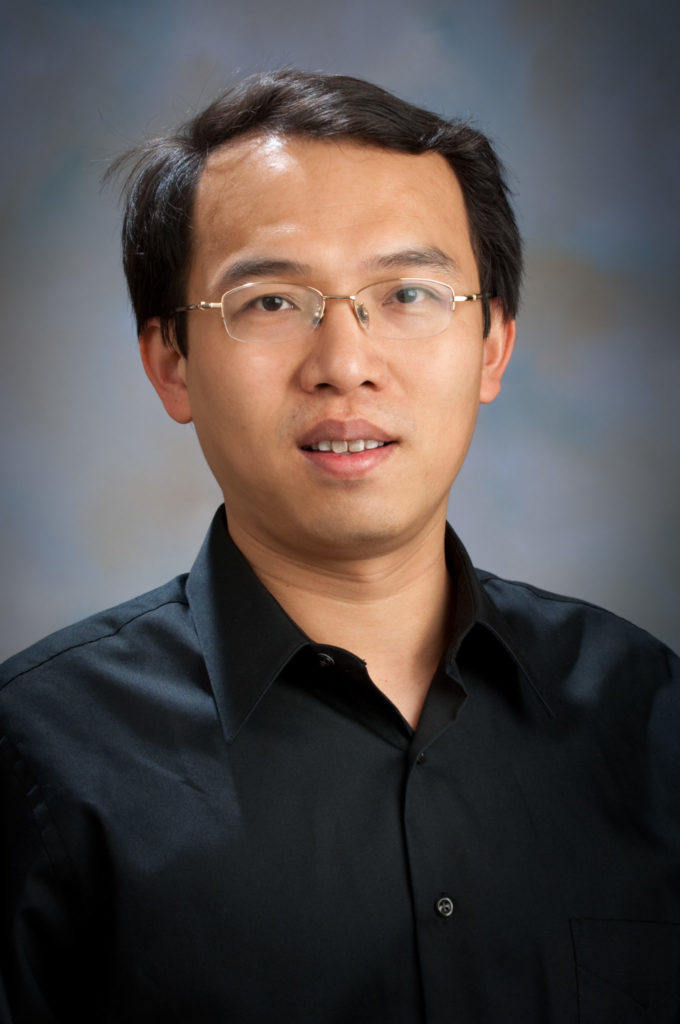Haonan Wang has been on the forefront of statistical analysis for nearly 20 years.
He is well known in the statistics world for a variety of research areas, but his most innovative work is referred to as object-oriented data analysis.
Object-oriented data analysis takes the principles of classical statistics and applies them to complex and abstract objects. Much of Wang’s work involves analyzing tree-structured objects and graphs, like the blood vessels and neurons in the brain, or networks of collaborations.
Wang’s creativity and research excellence recently earned him election as a Fellow of the American Statistical Association, the world’s largest community of statisticians.
“This is a significant honor bestowed by the ASA,” said Jan Nerger, dean of the College of Natural Sciences, “and recognizes Dr. Wang’s extraordinary contributions to the statistics community including his remarkable research, teaching, mentoring, and service to the broader statistics profession.”

The fellowship recognizes excellence in research, as well as excellence of character and service to the profession.
“I see Dr. Wang as a creative researcher at the frontier of contemporary statistics, which interacts with many other disciplines,” said Qiwei Yao, a professor of statistics at the London School of Economics. “He is outstanding in terms of the originality and the creativity of his research.”
Several faculty members in the Department of Statistics at CSU have already been named ASA fellows. Wang calls it a “long tradition. I just try to follow in others’ footsteps.”
Broad application
Object-oriented data analysis can be used to explore complex data objects with topological structure and geometric properties.
“What is the average shape of brain blood vessels? What is the average shape of a neuron in a certain region? Can we understand how the shape relates to a person’s age?”explained Wang. “Basically, we try to develop some descriptive statistics when the data has a very, very complex structure.” “When I first started working on this for my thesis with my advisor at the time, it was completely novel. I am so lucky to have started working on this 20 years ago when it was so new.”
Even though Wang has been working on object-oriented data analysis for years, he feels that this is still a very new field, and he is expecting to see an increase in demand for this type of modeling.
“With more and more people interested in this, I bet at some time it’ll be fast-tracked toward development,” he said. “This type of analysis will be more in demand, and with modern advanced computing these days we can do more with this type of analysis.”
Wang came to Colorado State University 17 years ago, after completing his graduate degree at the University of North Carolina at Chapel Hill in 2003, and has been researching new statistical methodology since he arrived. He now serves as a professor and graduate director in the Department of Statistics.
“Haonan does sort of everything for the department,” said Jay Breidt, interim chair for the department. “He’s one of these people who tirelessly advises graduate students, serves on committees, referees papers and provides editorial service. He does all of these things in a remarkably cheerful and helpful way. He’s just a really great person in addition to being an outstanding researcher.”
Wang teaches core theory courses in the master’s and Ph.D. program and “has contributed directly to the fundamental statistical knowledge and research preparation of a substantial fraction of statistics graduates,” wrote Breidt in his nominating letter to the ASA.
Legacy in the Ramily
Wang’s passion for working with students is evident, and he treats his advisees as colleagues, rather than students.
“I enjoy [teaching students], it comes from my heart,” he said. “I really treat this not as my job; helping students is my passion. I want to fulfill my promise as a faculty member here, and that is to see them be successful.”
Wang tries to guide interested students toward success, even in a difficult and relatively new branch of statistics.
“You have to have passion and creativity to want to do these kinds of things,” he said. “If they really like it and choose to research in this area, I will try my best to work with them and help them. I feel like I learn a lot myself as we move on in this path.”
Wang said that professionally, he grew up at CSU.
“One thing I like about our department and CSU is that we feel like a big family. That’s one of the things I really enjoy after 17-plus years here. This is a family environment; you feel very good working here.”
According to Hsin-Cheng Huang, an ASA Fellow from Academia Sinica in Taiwan, Wang is thought of as “one of the most creative statisticians of his generation with a distinguished list of research publications.” But Wang says he owes much of his success to the support he’s received from the CSU community.
“I really appreciate the department colleagues, chairs and the Dean. I think they provide the framework or the platform for faculty to grow. I feel like CSU is a place that gives you the opportunity to become whoever you want to be.”